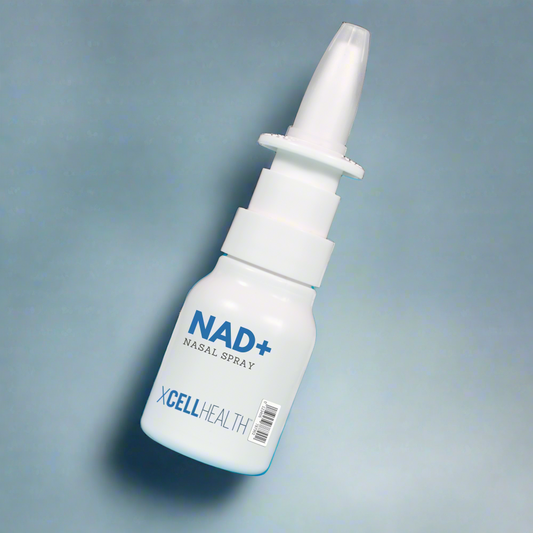-
NAD+ Nasal Spray (Medical Grade)
Regular price $179.00 USDRegular price$200.00 USDSale price $179.00 USDSale -
Biotin Injections (Home Kit)
Regular price $169.00 USDRegular price$199.00 USDSale price $169.00 USDSale -
Biological Age Test Kit
Regular price $489.00 USDRegular price
Collection: Longevity
Longevity is a highly desirable aspect of life, as it not only refers to a longer lifespan, but also encompasses the idea of living a healthier and more fulfilling life[1]. The benefits of longevity include maintaining cognitive and physical functions for an extended period, allowing individuals to remain active, engaged, and productive members of society. It can also contribute to stronger relationships and increased opportunities for personal growth and exploration.
Three compounds that have been shown to promote longevity and improve overall health are sermorelin, NAD+, and GSH (glutathione). Sermorelin, a synthetic version of growth hormone-releasing hormone (GHRH), has been found to stimulate the natural production of growth hormone, which declines with age[2]. This can lead to improved body composition, increased muscle mass, and a boosted immune system[3]. NAD+, as mentioned earlier, is involved in various biological processes such as energy production, DNA repair, and the regulation of circadian rhythms[4]. Boosting NAD+ levels can have a positive impact on cognitive function, improve memory, and help protect against neurodegenerative diseases[5]. GSH (glutathione) is a powerful antioxidant that helps detoxify the body, protect cells from damage, and support immune function[6]. Increased levels of glutathione have been associated with a reduced risk of chronic diseases and improved overall health[7].

Sources:
[1] World Health Organization. (2018). Ageing and health. Retrieved from https://www.who.int/news-room/fact-sheets/detail/ageing-and-health
[2] Velloso, C. P. (2008). Regulation of muscle mass by growth hormone and IGF-I. British Journal of Pharmacology, 154(3), 557-568.
[3] Khorram, O., Garthwaite, M., Grosen, E., Golos, T., & Yen, S. S. (1991). The effects of short-term, high-dose growth hormone administration on gonadal and adrenal steroid secretion in normal men. Fertility and sterility, 55(2), 334-339.
[4] Belenky, P., Bogan, K. L., & Brenner, C. (2007). NAD+ metabolism in health and disease. Trends in biochemical sciences, 32(1), 12-19.
[5] Hou, Y., Lautrup, S., Cordonnier, S., Wang, Y., Croteau, D. L., Zavala, E., ... & Bohr, V. A. (2018). NAD+ supplementation normalizes key Alzheimer’s features and DNA damage responses in a new AD mouse model with introduced DNA repair deficiency. Proceedings of the National Academy of Sciences, 115(8), E1876-E1885.
[6] Wu, G., Fang, Y. Z., Yang, S., Lupton, J. R., & Turner, N. D. (2004). Glutathione metabolism and its implications for health. The Journal of nutrition, 134(3), 489-492.
[7] Forman, H. J., Zhang, H., & Rinna, A. (2009). Glutathione: overview of its protective roles, measurement, and biosynthesis. Molecular aspects of medicine, 30(1-2), 1-12.



